sixty-three: you are just a door. i'm rik. fucking. mayall.
I never watched The Young Ones, Bottom, or Filthy Rich and Catflap in the actual 1990s. They are sincerely too much violence for me, even if it’s slapstick violence. But for some reason, things Rik Mayall and Ade Edmondson do when the script goes off the rails — or the rails deliberately dart out of the script — make me laugh and laugh and laugh. The amount of things I’ve whispered you are just a door to lately, where no one would understand it. Don’t worry; the door knows the rest of the sentence.
This is important for a month when it’s very difficult to map or model forward action. There’s been a tangible, now-familiar slowdown the past few months: the silent feeling of missed deadlines and people ghosting and vaguely clueless responses you know you got because someone was only half-listening at a maximum, and then got angry when they heard the wrong half and you insist on the result, you do not go away? (How dare I still need the thing done?) That tells me a lot of people are significantly overwhelmed, non-coping, and off their cognitive maps right now — basically in crisis but fronting through it, and all the little omissions and latenesses eat at each other’s last reserves of cope in ways that pull everyone down the shitter.
There is, practicably, not much I can do about this. It’s sufficiently endemic that “The Point of it All” abruptly felt like a radioactivity warning, and I cleared out more stalled tasks in one weekend than the three weeks before it. (Lot of people have a lot of opinions on Amanda Palmer as an artist and/or person, but she’s great for songs that sidle up at the right time to remind you you could die this way.)
So it has been a hell of a time to spend most of a month running prep for all the things you’re going to do once people hit the end of their crisis cycle, trying to navigate and/or time up people’s crisis cycles, and thinking about psychological splitting. Or, to render that how it actually looks in my head?
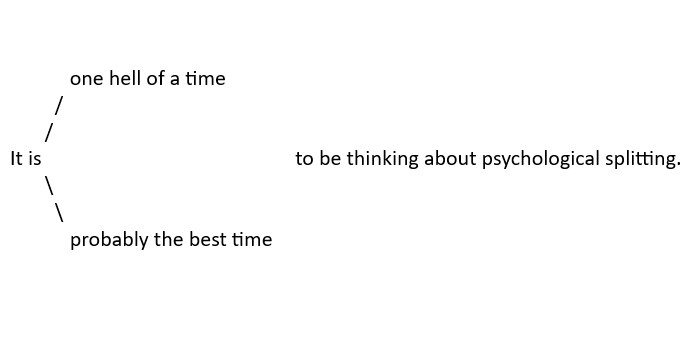
I’m really feeling for the Modernists and why they insisted that they needed to refigure the very physicality of language on the page. I mean, I had got it intellectually (you figure out a lot about why Eastern European 20th century fiction is so tonally like that too), but oh, yeah guys, it’s not the same thought in that shape and this matters. This may be worth a tour through the 1920s collection at the AGO again: this time just looking at shape, at how the shape of it matters.
speaking of psychological splitting
This semester’s course kicked off at the beginning of May, and it’s on Food Policy and Programs, which is to say it contains a heavy dose of microeconomics. In fact, it’s been basically just microeconomics for the past five weeks, in bite-sized doses, which at least doesn’t take up too much of my headspace. It will surprise no one that it is virtually impossible for me to interact with Stuff Economists Write without heckling it into the very mantle of the earth and then watching to see if the hole closes for good measure. Quantification as a life path is for D&D and Henry Kissinger. Over here we prefer to let the complexity breathe.
More seriously, I’m not sure the concept of markets and rational actors as writ — or even demand — really survives after you’ve been anywhere near passion industries or care work, either formal or informal. If you want to know what people really value, it’s far more revelatory to think about what they insist be done for free and by whom: the John M. Fordian inadmissible need. I’m quite glad I read my way into epistemics before I came to economics. Why might you think that? does a lot of lifting over here.
But since it’s my first formal brush with the matter, this has explained a lot about the moments where economics people seem to leap without warning into the Mirrorverse when they’re working a problem. If you predicate your entire worldview on a perpetual, unsolvable baseline condition of selfish actors at play in the fields of being overwhelmed (“Economics is the social science that studies the choices that individuals, businesses, governments, and entire societies make as they cope with scarcity, and the incentives that influence and reconcile those choices.”) — well. No wonder some wild decision-making ensues. It’s a setup for being in crisis neurology every hour of the day: you can never achieve the point at which there is enough, or rest. Or, y’know, trust.

I will be good (for now) as this is a required course, but I have made a note that reads: Boooo what is the science of choosing from abundance you goons? And I think that is a good question. Assume there is probably enough, supposing you’re clever and cooperative enough about it and you’re reasonably kind about the human mess you’ll encounter on the way, but you’ll get a few cracks at the problem. You really do get farther solving things in the world outside of trauma head.
Anyways, it is not lost on me I’ll be going through this material during both delicious garden season, the time of abundant free food grown by my own self or my friends, and what’s likely to be a major economics-induced food security crisis coming down the pipe any minute now. Expect further updates to be — well, a little on the nose, let’s put it that way. I know it’s why I did the program after all to start with, but life, she’s rarely this thematic.
engage
The social enterprise incubator was also a little on the nose, although in ways not unvaluable: Four hours on two successive Friday afternoons about refining an idea into pitchable format and the components of stakeholder engagement. So: light and introductory stuff, but useful in that it got me thinking more rigorously about what was behind the idea I brought in, and illustrated some epistemics? Again, businessy people: definitely using particular baseline assumptions about the world, and sometimes the choice set around a project is whose assumptions and foundations you want to engage with as the idea makes contact with reality. (Whose concessions do you actually want to make?)
This is relatively chill business for me because what I brought was a third- or fourth-string idea that’s been gently nagging me for a year now: one that has a real hole in it, and I know the hole, but the overall attraction still doesn’t go away. If I do it, it’ll be at least a year from now, after fruit trees and some personal projects and writing projects are (ostensibly 🤞) finished up. So it’s back into the soup, to see if I still like it enough to keep going.
farmer’s almanac
The cool crops edition of the garden is fully out, although the weather quite firmly made its own decisions the back half of this month. It’s the coldest May we’ve had in decades here in Toronto: 8 C and nonstop raining when it’s usually a solid 17 C, and this is fucking with my crops. The spinach, arugula, and brassicas can’t get enough of it. I’m worried about the tomatoes, cilantro, cucumbers, and peas. It’s been cold; my beans are slow. Climate change has come for my balcony.
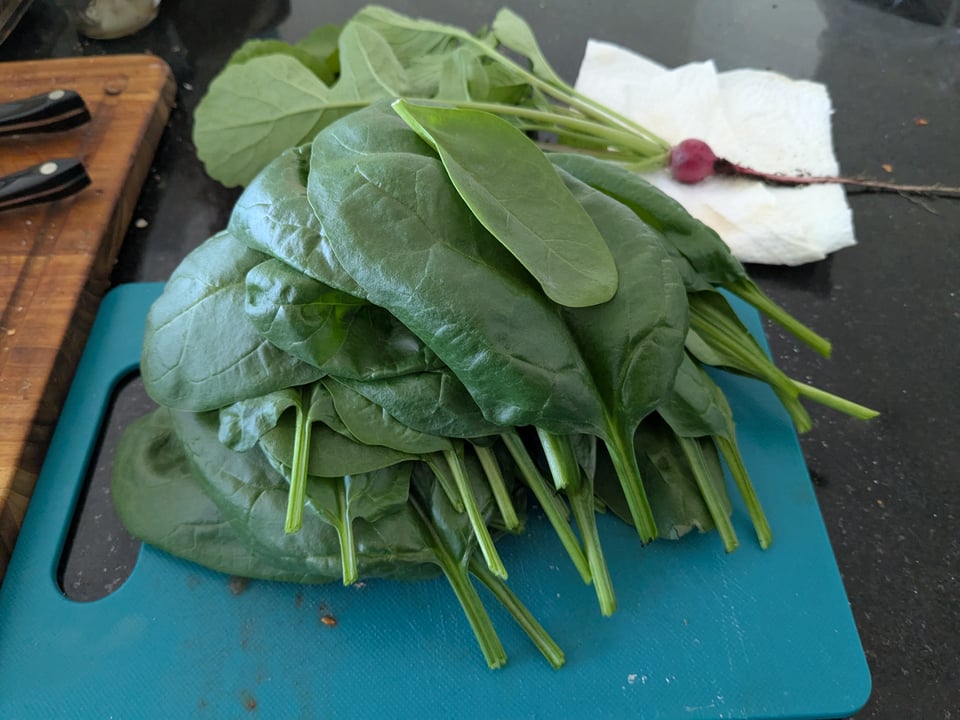
In the wake of that, though: developing some process? And process that I think is potentially quite healthy: just listening better to the land, if we think of land as my air, my barometer and wind exposure, my local bird population, my containers, and which plants seem to really like what’s going on here. The potatoes love this stuff; so I can sprout and plant a few more potatoes. I’ve got no shortage of seeds on hand, and — I mean, worst case we pivot.
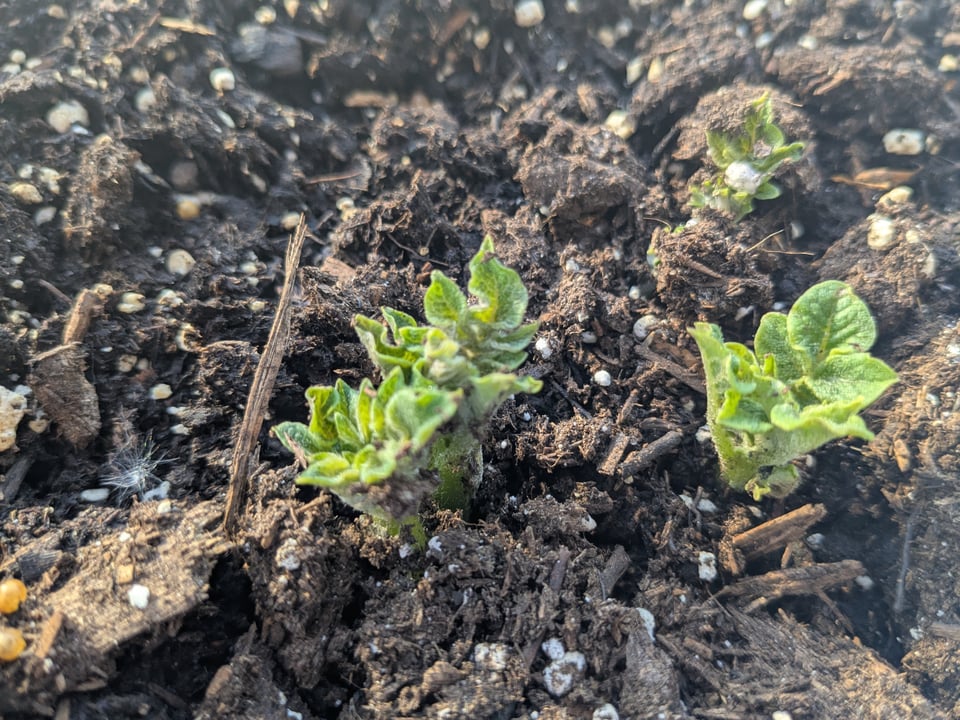
Maybe most of what fucks a person over on many levels is when you can’t or won’t deke back to first principles: when we sanctify an established process over what’s actually good for this problem in these conditions, today, now. It might be that what’s good for this summer is I’m growing a lot of potatoes and leafy greens and getting ready to jump when the weather goes hot. We just — find out, right?
In the meantime, it’s flipped from babying-the-plants time to eating-out-of-the-garden time almost in an eyeblink. I spent a good chunk of yesterday afternoon weeding, checking in, and replacing some of the seeds that didn’t sprout, or seedlings that didn’t handle the cold well. And with the detritus clear, it was reasonable to cut all that spinach; I can probably start harvesting some red cabbage leaves and kale as soon as I want to eat them. I’ve already been dipping into the arugula planter for sandwiches, and the radishes turned out a little meh, but the greens will make a nice stirfry. I didn’t even notice us getting here, and we’re here: One-metre diet season until further notice.
things watched
Agnès Varda’s Les glaneurs et la glaneuse came recommended, actually, by one of my Urban Food Security professors as a complement to the research I was writing last month. It’s available on the Internet Archive, avec subtitles for those what need ‘em. A lot on gleaning as a practice, food waste, “ugly” fruit, trash reclamation, the art of refusal, and poverty as it was happening 25 years ago, which seems oddly gentle in retrospect, which is not really a good thing.
I’m never sure if I’m projecting, but there’s a calm to European agriculture documentaries over North American ones when they talk about the work and the land, which I can only think of as secure attachment. They’re missing a palpable edge. There is a lot to say about industrial agriculture and particularly crop importation in North America, but the thought I come back to is that I think it might well be a system that remembers it started as an argument, and the comparative peace in watching French peasant farming or Turkana goat herding in Kenya (another of this month’s watches) describes the shadow of that argument, just by its absence. (See: A theory of the world that presumes sufficiency is possible.)
My favourite moment here: An older guy in the sun, before a backdrop of disturbed furrows, talking about gleaning potato fields (shoutout my man Parmentier who has apparently sponsored this issue). There are always a lot left behind, he says. Not too small or crap, the good ones, “the ones you eat with herring.” And he abruptly gets this massive smile, and you can just see that the memory of that meal just broke over him and he’s delighted; the apotheosis of aw yeah herring. You’re just instantly caught up in the moment he’s caught in. Free potatoes, dignity, and pleasure. Rife with adoration, I watched it again and again.
things read
The most important read this month was a review I pitched with relish the moment the title was announced: Maggie Helwig’s Encampment: Resistance, Grace, and an Unhoused Community. Aside from being a very good novelist and one of the interview sources for my prison book, specifically about growing up around PIC abolition communities, Maggie is the Anglican priest at St. Stephen’s in Kensington Market, where an encampment gathered in 2022 — it’s always been a church that supports the urban poor. And this is a book about that: the circumstances that brought it there, the dynamics, and the municipal response that dismantled it.
The actual review will be in Spacing soonish — I don’t have a formal issue date yet — but wanted to add in a few quiet notes that won’t make it to press with a 500-word limit in play. With everything recounted in this book — the unhoused and precarious people of Kensington, a slice of queer Toronto, navigating crisis lines for people too in crisis to do it themselves — also being pieces of my own communities, it was an emotional and slightly harrowing read. Five years in, it’s actively healing, but when I see something as foundationally sane as this, even on a relatively good day there is still a seam of moral injury in the body that cracks open wide, wanting to absolutely scream like it just scented water, and so it can safely admit just how thirsty it is.
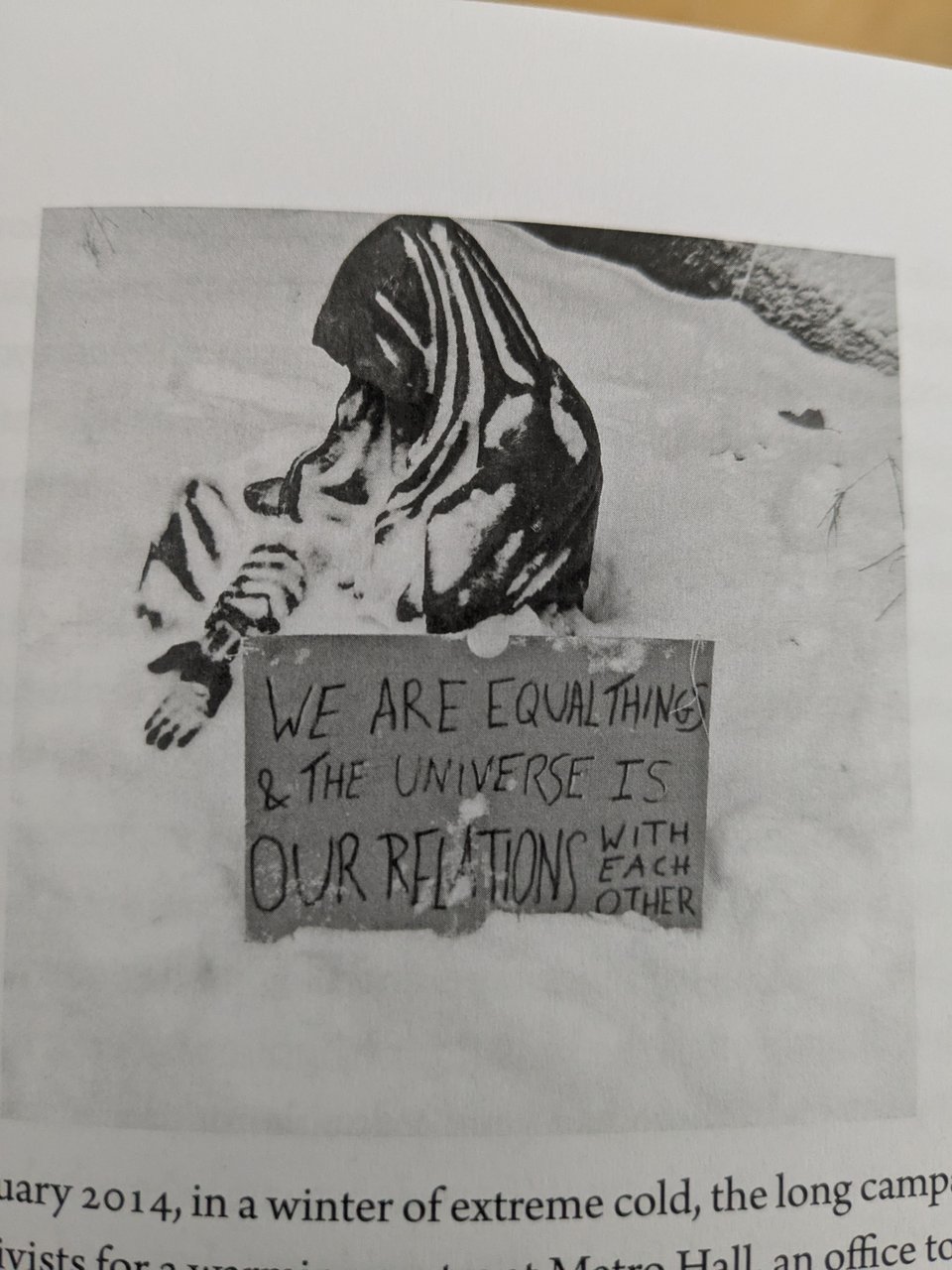
I admit I play off the seriousness of that a little when I talk about it: usually as I need some adult conversation around here. The actual translation is: I need to speak to some people who aren’t black-eyed with trauma-logic and reaction and know right from wrong, hawk from handsaw, human from object — and it hurts most days, the lack of that. Of society.
So I read this baseline distraught, in a very similar way as I spent the snack break in November’s Food Charter consultation hiding on the toilet with a hand over my mouth, whispering to myself I am so fucking angry, and somehow all that distress ran thankfully clean because it involved no bullshit or prevarication for once. And that is from minimal exposure to the issue.
I have very few pretensions about how tiny a piece of this world I’m involved in. Keeping a food security non-profit from packing it in over here, a few crucial nights of guerrilla out-of-the-cold work there, day-in-and-day-out directions for people panhandling about where the free sandwiches and resources were, years’ worth of hassling City officials about emergency shelter space to the point where it’d go why do I have to keep calling you?, years of mutual aid networks, some pointed Budget deputations, a whole lot of semi-official advocacy, and the logistics that delivered 40,000 meals and rising without killing the people on the back end. I do little things.
I have never really taken a risk in this work, and I barely put myself out in any sustained way. There’s a reason I say doing shit is easy and didn’t call myself an organizer for years; it’s cost me almost nothing but a little dedicated time. But there’s still a wound in here about it, because when we got to here, I put it down and said in something like a growl: Oh no. No no no. That world is still alive, because god help me I will carry it there in my mouth if necessary. Backwards and in heels.
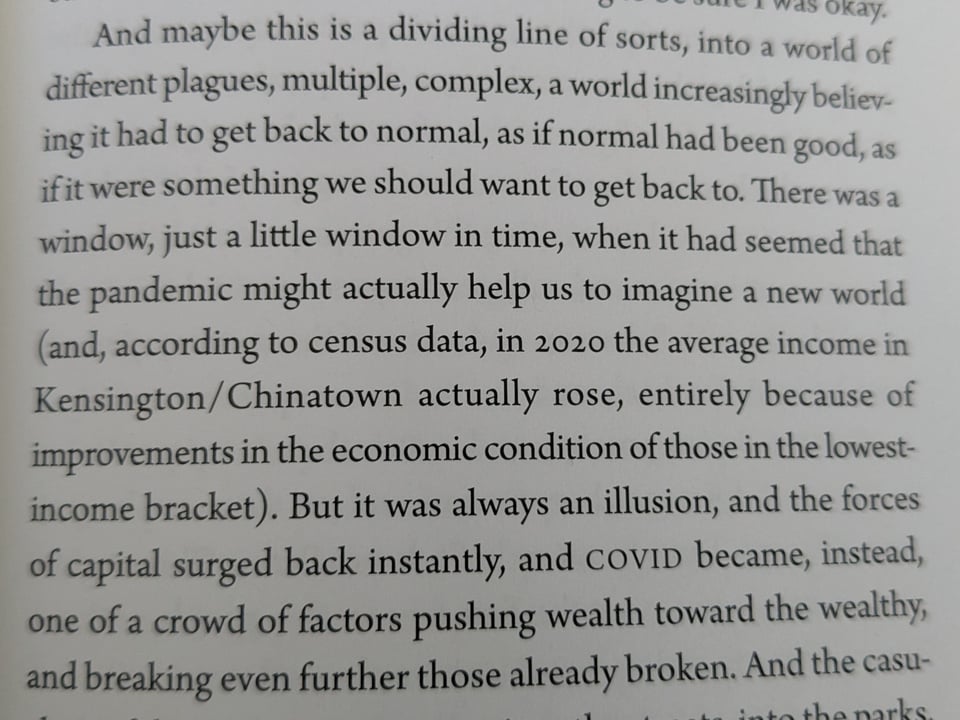
Sometimes you go places, read things, have conversations not just to learn something new, but uncover what you actually think. And this is the piece that is not review readers’ problem but which I took from this book, affirmed fiercely.
That when we decide for ourselves what the world is we choose some things to concede; we choose which frame we’ll put on it, which pieces will inevitably be left out, which tradeoffs we make. And I am not ready to make certain concessions yet. No, active voice: Along the lines of Edna St. Vincent Millay, it does not suffice and I do not concede. Many things are perilous and exhausting right now, but I am the comedian. That is just a door.
See you next month, all.